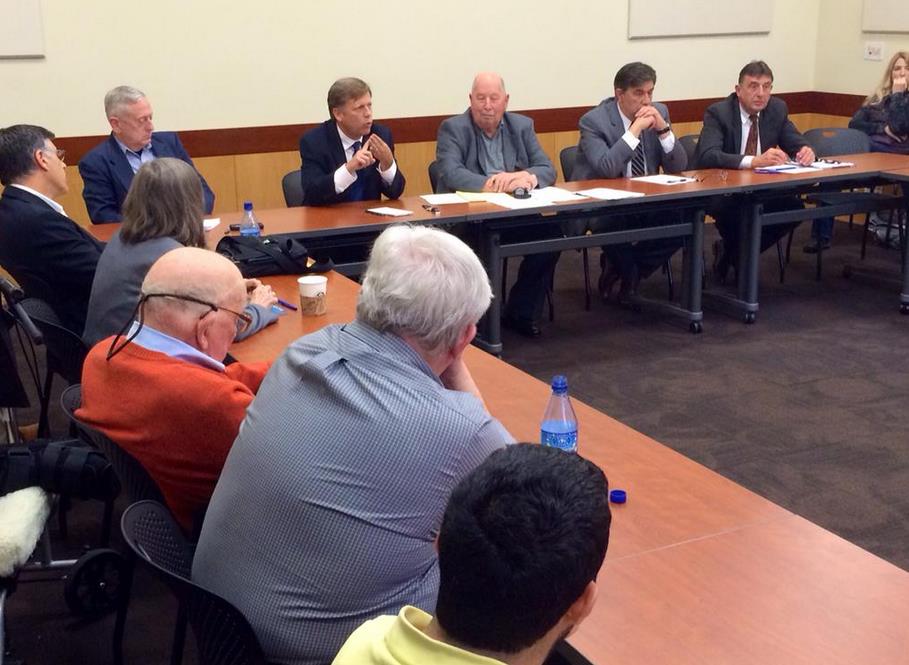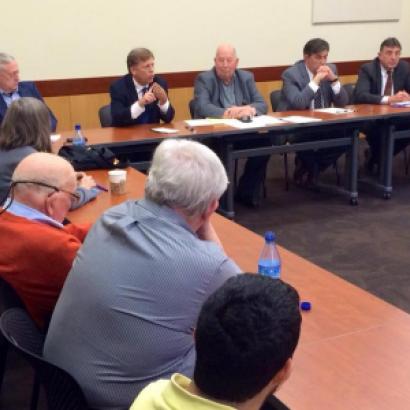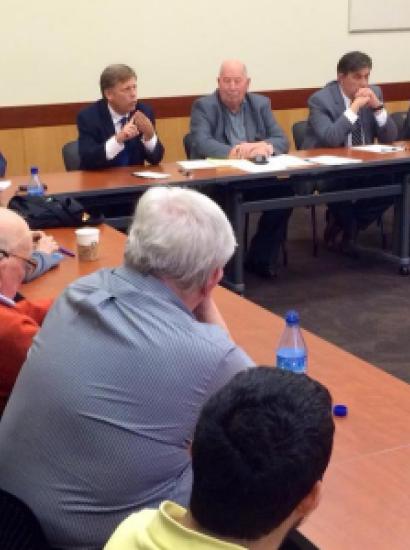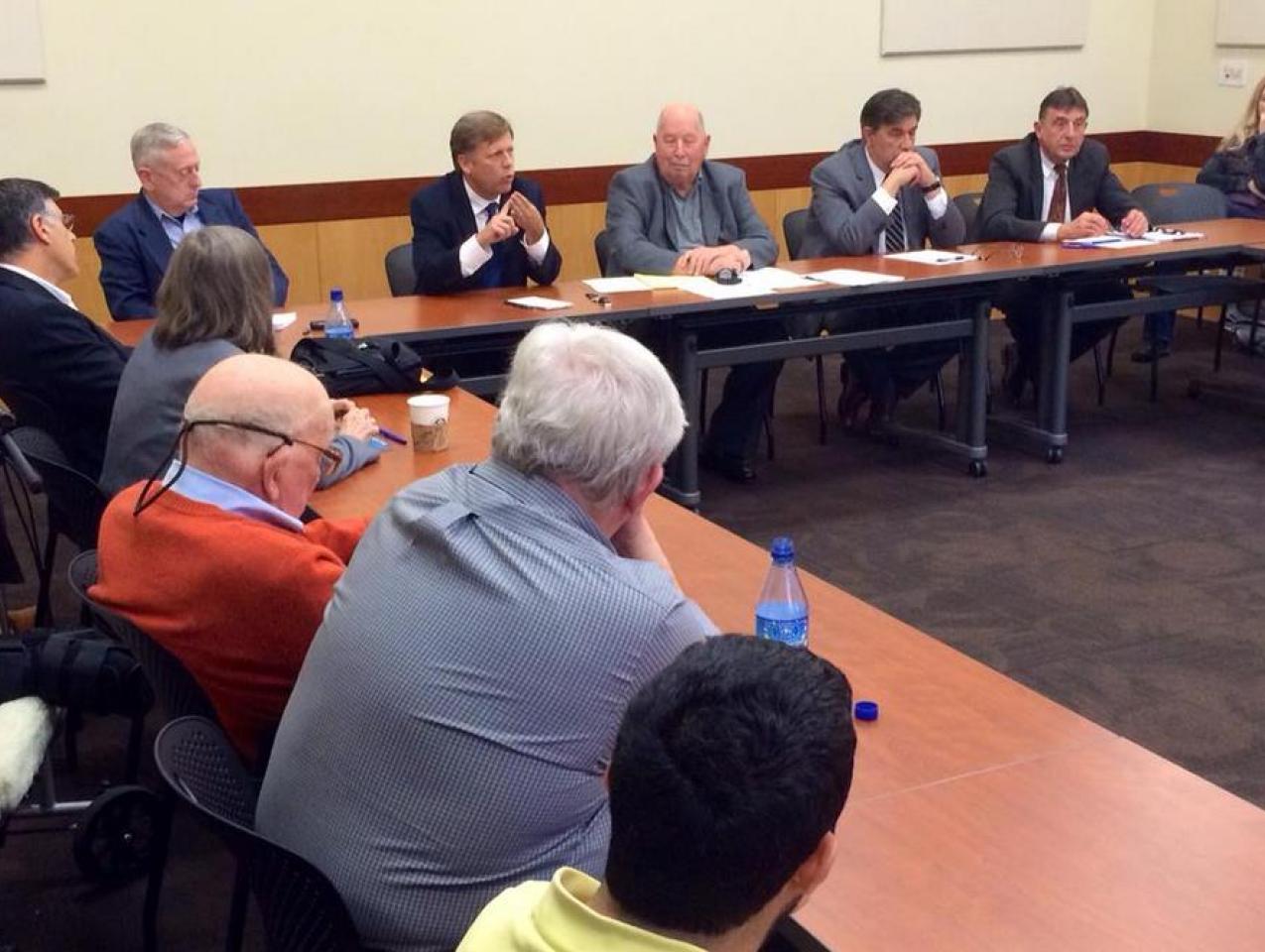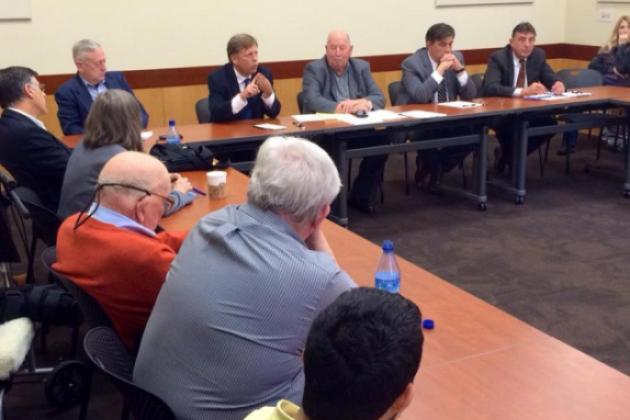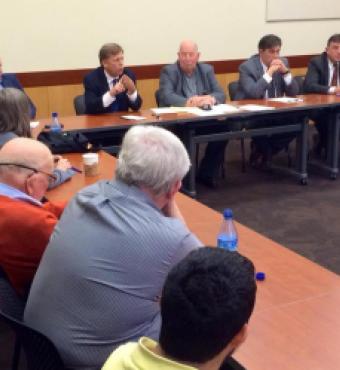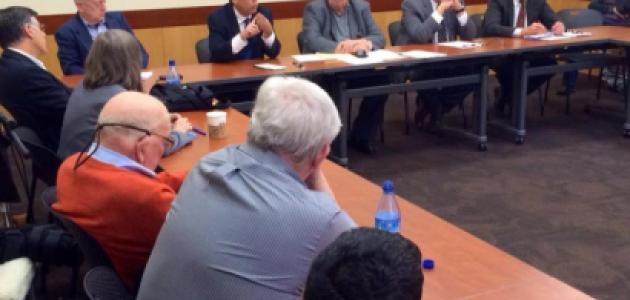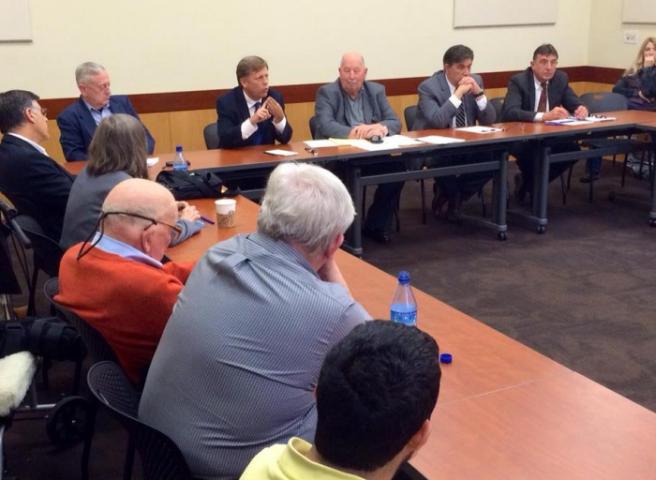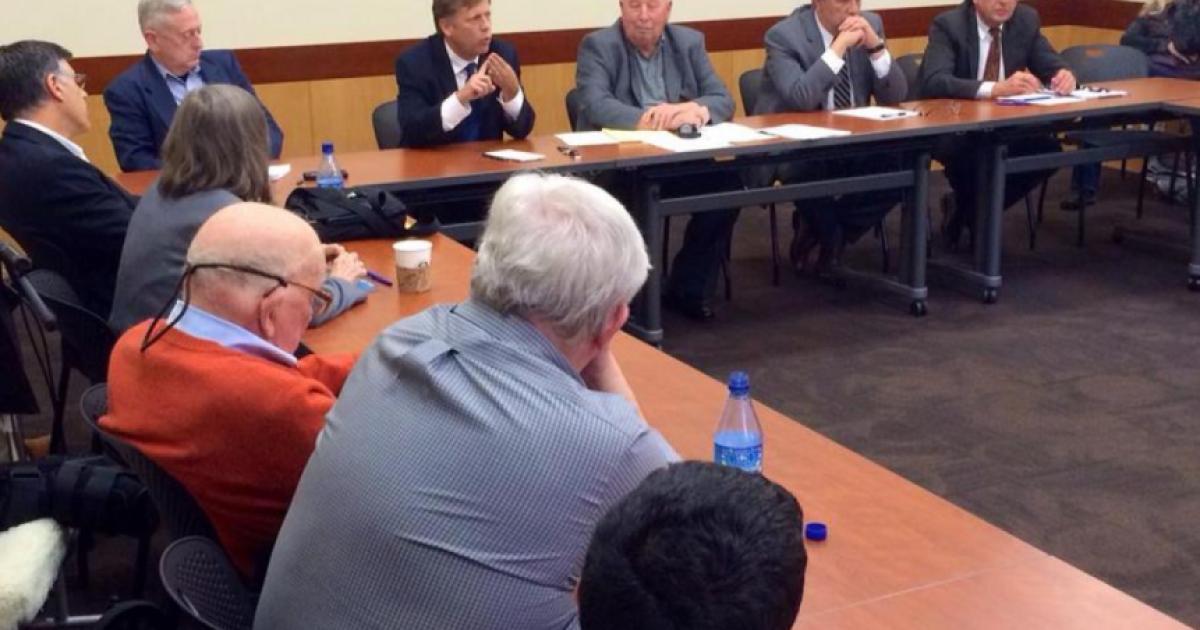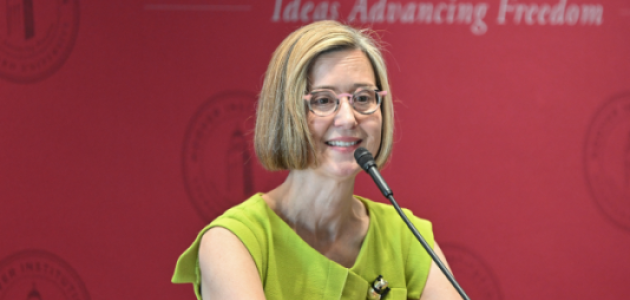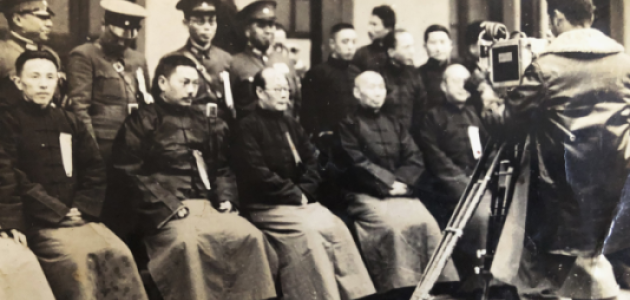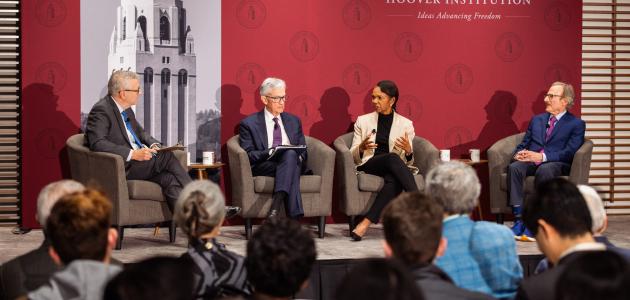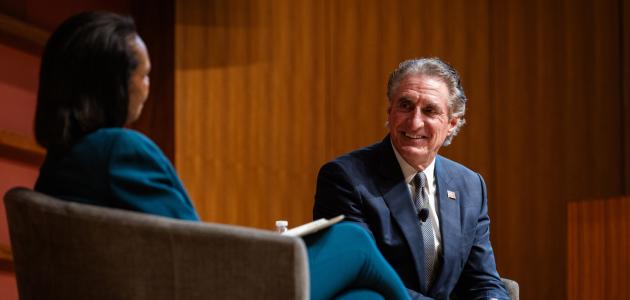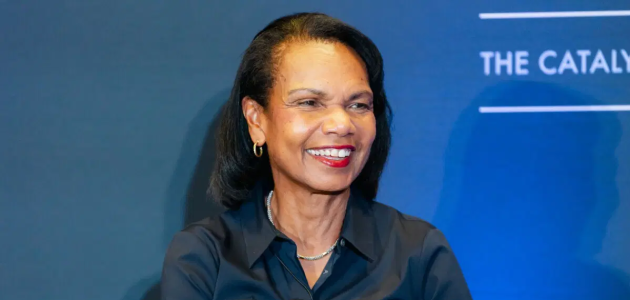On March 10, the Hoover Institution held a roundtable discussion on “Perspectives on Russia’s Hybrid War on Ukraine and US Foreign Policy." Hoover fellow Paul Gregory moderated; presenters were Michael McFaul, director of Stanford’s Freeman Spogli Institute, Hoover senior fellow, and former ambassador to Russia; Alexander Yarim-Agaev, a professor at Donetsk Technical University; General Jim Mattis, (ret) former commander of the US Central Command (CENTCOM) and Hoover Annenberg Distinguished Visiting Fellow; and Yuri Yarin-Agaev, Hoover visiting fellow. The speakers limited their remarks to brief introductions to allow maximum time for discussion.Ambassador McFaul spoke of his impressions of Russian president Vladimir Putin, going back to their first meeting Ambassador McFaul spoke of his impressions of Russian president Vladimir Putin, going back to their first meeting in St. Petersburg, where Putin worked in the mayor’s administration before being brought to Moscow by the Yeltsin administration.
McFaul explained that Putin declared in his first term that anyone who does not regret the collapse of the USSR has no heart, but he who wants to restore it has no brain. In this earlier period, Putin listened to liberal economic advisors. He introduced reform including a flat tax, and the economy grew at high rates for eight years, earning Putin loyalty from the Russian people, reeling from the chaos of the Yeltsin years.
McFaul emphasized the importance of the 2011-2012 parliamentary and presidential elections on Putin’s thinking. The 2011 parliamentary elections had the usual amount of election fraud, but voter dissatisfaction brought out huge street demonstrations. The President Medvedev’s reaction was to sit down with the opposition to discuss new ideas for reform. Putin’s reaction was to crack down. He was frightened by the unrest and attributed it to outside influences. This was a threat that must be crushed. Putin easily won the March 2012 election, again by fraud and keeping viable opponents off the ballot. At that point, McFaul declared he concluded that the “reset” was over. There would be no deals on arms control, Syria, and so on. Nevertheless, in this period 2011-2012, Putin was still able to compartmentalize, saying in one breath that the West was out to get him and in the next breath claiming that Russia’s deal with ExxonMobil pointed the way to future Russian-American relations.
McFaul believes that Putin responds to circumstances as he interprets them. The key turning point was the Maidan protests and Putin’s belief that the CIA was out to force Ukraine into its sphere of influence while taking the Kremlin for a ride. McFaul explained that the United States was doing its best to strike a compromise deal in Ukraine, but Putin came away convinced that the decadent capitalist West was out to get him.
McFaul also noted an unusual change in Putin’s meetings in recent times, shifting toward religious and clerical advisers, which McFaul characterized as perhaps Putin’s dealing with his mortality.
McFaul has a pessimistic view of the future of Russian-Western relations. Putin will not go away soon; his views of the world and his goals will not change, and he is winning the propaganda war. Putin has a strong belief in his ability to control events. We must understand that we will be at odds with Putin for the long run and that we must develop a long-term strategy to deal with him. There are no easy solutions, but we must be consistent in our responses to the Kremlin under Putin. We should not be surprised if years from now we are negotiating a tenth Minsk peace agreement with Russia.
General Mattis reviewed the military situation on the ground in Crimea, east Ukraine, and the periphery of NATO states. He described Putin’s hybrid warfare, which is not new but has been perfected by Russian military planners. Mattis emphasized the importance of the propaganda component of Russia’s hybrid war, which Russia is clearly winning over the West. Mattis also focused on the costs of the Ukrainian war on Russian forces, which have had to be drawn from all corners of Russian, leaving potential trouble spots, such as on the southern border, uncovered.
Mattis noted that Russia at first hoped that it could occupy East Ukraine without loss of life as it did in Crimea but was surprised by the Ukrainian forces fighting back with vigor. The Russian military had to increase its logistic and military support for its rebel forces and then, in August, had to use regular troops to save the encircled Donetsk and Luhansk “people’s republics” from defeat.
With regular Russian forces involved, Ukrainian forces have been outmatched, notably by deadly artillery weapons (such as dual-purpose missiles, banned by the United States) that explode multiple warheads overhead. So far, Russia has been able to fight a tank war owing to the lack of antitank weaponry on the Ukrainian side. Mattis elaborated the military equipment Ukraine needs to defend itself, most of which is available from various NATO states and from other countries. The U.S. supplying lethal defensive weapons would represent a major breakthrough, although Europe is now less inclined to follow US leadership.
Mattis estimated Russia’s nonmilitary to military effort in fighting the Ukraine war at approximately four to one, highlighting the importance of nonmilitary instruments, such as propaganda, in support of the military effort. Ukraine is stretched to its limits with no operational reserves, and its front-line units are depleted.
Mattis noted a nuclear context to this war, which he emphasized is a war. He believes that Putin desires “anarchy protection” (which others have called frozen conflicts) on its borders. NATO expansion did not persuasively demonstrate to Russia the value of having democratic neighbors under the rule of law. In fact, Russia under Putin likely considers neighboring rule-of-law countries a threat to Russia’s nondemocratic, anti-rule-of-law governance.
Alexander Yarim-Agaev denied that military action in east Ukraine is a civil war growing out of dissatisfaction with the Maidan revolution, for there were no problems with ethnic or linguistic divisions before the overthrow of the Yanukovich regime. In fact, the eastern regions controlled the top three positions in Ukraine national government.
The only losers from Maidan were local and regional officials of the Yanukovich administration who feared losing power and privileges. Their attempts to organize protests failed (despite Russian assistance) until the Russian intervention that put Russian citizens or local “marginals” in control of occupied cities. These occupations resulted in economic collapse and terrorization of the population, as paratroopers, many of them Chechens and Ossetians, patrolled the city and detained and arrested people without cause. Yarim-Agaev noted that both he and his wife had been stopped by armed men and his wife was threatened with being shot.
One and a half million people have fled the Donbass area, possibly the greatest number of refugees in recent time in Europe. Those who stayed are on the edge of a humanitarian crisis largely ignored in international negotiations that seek a truce that preserves the status quo, meaning for many people in the area possible starvation and death.
Yuri Yarim-Agaev began by commemorating Boris Nemtsov, friend of Ukrainian and Russian democracy, tragically killed by Putin’s regime.
Yarim-Agaev declared that what we are seeing is not a civil war but a war between two forces: Russia versus America and Western democracies on the other, similar to the Korean and Vietnam wars against Soviet communism. Of the fifty thousand troops fighting on Russia’s side, about fifteen to twenty thousand are Russian mercenaries and fifteen thousand are regular Russian army. In his report on the war, Nemtsov identified two airborne Russian divisions and four motorized brigades in Ukraine, with all heavy weaponry supplied by Russia. Hence, Ukraine is not merely another country that we support but our ally in this global conflict, fighting on the front line.
Putin’s Russia is our enemy, whether we like it or not. Russia considers the United States its main enemy, and if we are Russia’s enemy then Russia is our enemy. These relations are indivisible. If Russia is our enemy in the conflict with Ukraine, it cannot be our ally, partner, or go-between in our relations with Iran, Syria, war on terror, or anything else. Our policy toward Putin’s Russia should be clear, unconditional, and strong and aimed at weakening it and stopping its aggression. He must get out of Ukrainian territory, including Crimea, and out of Ukrainian politics.
We must counter Putin's propaganda with all the power of America's media. We must expand broadcasts by Radio Liberty, Voice of America, and other stations, and we must continue and expand economic sanctions. Weakening Putin does not automatically translate into strengthening his opposition or making Ukraine stronger. Currently, the Russian economy is in recession owing to the pressure of economic sanctions and lower oil prices. Yet the Ukrainian economy is deteriorating even faster. The ruble has fallen by a factor of two, whereas the Ukrainian hryvna has fallen by a factor of four. The Russian army is not in the best shape. Yet the Ukrainian army is much weaker. Our policy should weaken Russia and undermine its aggression but also make Ukraine stronger militarily, economically, and support democracy and rule of law. We should provide lethal military assistance.
We should have no illusions about the state of Ukraine’s governance, which is still weak and corrupt. Our policy toward Ukraine should be supportive yet assertive. We should provide weapons but also military advisers, who will control the use of the weapons, which otherwise could end up in Russia’s hands. We should provide economic and financial advisers to insure the money is not wasted or stolen. The war in Ukraine, as was the 2008 war in Georgia, is part of the prolonged agony of the collapse of Soviet communism, which hasn’t yet been uprooted There was neither a Nuremberg trial nor a de-Communization, such as the de-–Nazification of Germany after WWII. The main communist structure, the KGB, was left nearly intact. Having come back to power, it is intent on restoring the Soviet Union. We need to finish this job now by bringing bring back and refining the most successful of Reagan’s policies that helped bring down Soviet communism.
This seminar, as with several other events that we organized in this institution, are steps in this direction. Yet we can do better. Hoover’s unique expertise could launch a sustainable and comprehensive program, dealing with totalitarian ideologies and methods of countering them. Such a program could be of great help to our policy makers, to America, and to the people of Ukraine and Russia.
A lively Q&A period followed. Among the many questions discussed were from Admiral James Ellis (“Is Putin strong or weak?”), Enrique Oti (“What is our ideology to counter Putin’s propaganda?), Piotr Kosicki (to McFaul to “elaborate on Putin’s meetings of religious figures”), Alvin Rabushka (“Comment on the similarities between China’s growing repression and that of Putin?”), Markos Kounalankis (“The effect of sanctions on the Russian economy?”).
These notes have been prepared by moderator, Paul Gregory. He bears responsibility for any errors or misinperpretations of participants statements.







